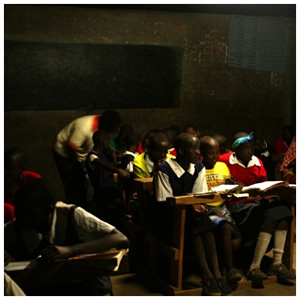SunnyMoney social enterprise founded by SolarAid has announced sales of over one million solar lights to families living without electricity in rural Africa; bringing clean, safe affordable lighting to over 6.4 million people. The enterprise uses an innovative business model to sell and distribute solar lights in off-grid Africa to end dependency on costly and toxic kerosene. SolarAid which is a UK-based international charity that believes in business-based solutions to poverty and climate change intents to eliminate dependency on kerosene by introduced solar lights through SunnyMoney.
It sets the foundations for an emerging solar market that will provide access to life-changing renewable energy technology for millions more to come. The unprecedented achievement is the first milestone towards the joint mission with UK charity SolarAid, who owns and funds the social venture. Their mission is to eradicate the kerosene lamp from Africa by 2020.
SunnyMoney has grown rapidly from selling less than 1000 solar lights per month in 2010 to an average of 50,000 each month today. In Kenya, the social enterprise has sold 290,000 solar lights to date and is expecting to sell that many in 2014 alone. Over 566,000 lights and mobile phone chargers have been sold in Tanzania. Sales in Zambia, Malawi and a pilot in Senegal have exceeded 144,000 units.
Commenting on the tremendous growth, SunnyMoney Global Marketing Director Cindy Kerr said there is demand for affordable, accessible and trusted energy solutions for 110 million households in Africa currently living without electricity. 91 percent of Africa’s rural population and 85% of the population of Kenya do not have access to electricity and are therefore forced to use fossil fuels such as kerosene or paraffin for lighting.
“Families and communities off the grid ‘burn up’ to 25 percent of their monthly earnings. Once a solar light is purchased, stopping kerosene saves up to Ksh900 monthly, improves children’s study time from one to three hours, and makes the home a safer and healthier environment with over four hours of bright light a night, “she said.
SolarAid impact research shows that household saving are spend on improved nutrition, school fees and business input. Kerosene makes homes unsafe – increasing the risk of serious burns and poisoning. The light from kerosene lamps is too dim to read or study; it hurts the eyes and is known to cause respiratory problems. Research shows that kerosene lamps are a significant sources of atmospheric black carbon and emit 20 times more than previous estimates, At least 270,000 tons of black carbon per year is estimated to be emitted from kerosene lamps worldwide. Portable pico-solar lights and mobile phone chargers are proving a popular investment for families.
According to SunnyMoney Global Chief Executive Officer Steve Andrews, innovative community-based approaches have been key to sparking the growth that is necessary for building a sustainable market solution.
“In the last year, we have worked closely with teachers who act as solar advocates to raise awareness, instill trust and create channels for solar lights to be purchased in rural villages. Once people see a neighbour’s light shining bright, demand grows. We then recruit and train local agents to stock and sell our range of home, small business lights and mobile phone chargers”. With one million solar lights an estimated $235,000 is being saved by families every day and children are gaining 3 million extra hours of study time every night, helping Africa’s youth work towards a brighter future.
As SunnyMoney continues to grow in Kenya, Malawi, Zambia and Tanzania, sales of another million products and expansion to Uganda and Senegal are planned for 2014. Key drivers of the growth will be through both the Sunny Schools campaign and the recruitment of over 1000 independent agents who make money selling a range of solar lights and products.

